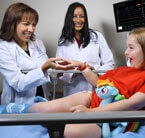
Pediatric gastroenterologists Maria Oliva-Hemker, left, and Suchitra Hourigan with a fecal transplant patient.
Call it therapeutic poop, if you will, but the best hope yet for an effective treatment of childhood infections with the drug-resistant bacterium C. difficile may come straight from the gut, according to recent research.
This is why pediatric gastroenterologists at the Johns Hopkins Children’s Center have launched a fecal transplantation program for patients with recurrent diarrhea caused by what they say is a wily pathogen that is increasingly impervious to drugs administered to children and adults. Over the last 20 years, cases of antibiotic-associated diarrhea have more than doubled, with nearly three million new infections each year. Up to a fourth of patients are not responding to antibiotics, and most such cases, the research shows, stem from infections with C. difficile. A recent Johns Hopkins study published in the journal Inflammatory Bowel Diseases revealed that children with Crohn’s disease and ulcerative colitis are more likely to be asymptomatic carriers of toxigenic C. difficile than children without either condition.
Enter poop transplants. Studies in adults show that more than 90 percent of patients are cured following such therapy and, experts say, they have every reason to believe the numbers would be equally impressive in children.
“Fecal transplantation—or the transfer of ‘good’ bacteria from the colon of one person into the colon of another—should be considered for all children with C. diff infections who don’t respond to standard antibiotic therapy,” says pediatric gastroenterologist Maria Oliva-Hemker.
The rise in refractory C. difficile infections has been fueled by the growing use of antibiotics, experts say.
“Antibiotics are lifesavers, but anytime we give them to a patient to eradicate one pathogen, there’s collateral damage, in that along with the bad bacteria we wipe off some good organisms that help keep the complex workings of our gut in perfect balance,” says Oliva-Hemker.
Such beneficial bacteria work by keeping rogue players in check, Oliva-Hemker explains, so any shifts in gut environment—such as ones caused by antibiotics—can have dire consequences. When good bacteria are killed off by antibiotics, the bad guys multiply causing an imbalance or “dysbiosis,” Oliva-Hemker says. Typically, gut infections caused by one antibiotic are treated with another one to eradicate the overgrowth of harmful pathogens, but drugs often fail to do so fully or permanently because they only treat part of the problem.
“When we administer an antibiotic to treat the C. diff infection, we destroy some of the bad bacteria, but that does not address the other half of the problem—the loss of good bacteria that might have led to the infection to begin with, so we never truly restore the balance in the gut and often the diarrhea returns with a vengeance in a matter of weeks,” says Johns Hopkins pediatric gastroenterologist Souchitra Hourigan.
The concept of treating poop woes with poop is hardly new. The method originated with ancient Chinese healers who gave their diarrhea-ravaged patients “yellow soup,” a concoction of fecal matter and water. Nowadays, fecal transplants are often performed during a colonoscopy, but can be performed via nasogastric tube as well. Improvement can be seen as soon as one or two weeks. Fecal donors, usually parents or relatives, are carefully screened for risks much like any blood donor, Hourigan says. The donor’s blood is tested for infectious pathogens, such as HIV and hepatitis C, and people with autoimmune diseases or other chronic conditions, such diabetes or obesity, may not qualify as donors.
The new pediatric protocol makes Johns Hopkins Children’s Center one of a handful of pediatric hospitals in the country to offer this therapy for a condition that can cause dehydration, anemia and pain, and can seriously affect a child’s quality of life, leading to absence from school.
Oliva-Hemker and Hourigan’s research is attempting to answer how donor bacteria change the recipient’s gut microbiota and which bacteria make the best poop transplants. With the growing understanding of gut dynamics, better therapies should emerge. In the near future, Oliva-Hemker predicts, scientists will be able to design the perfect fecal concoction in a lab, removing the need for such transplants.
